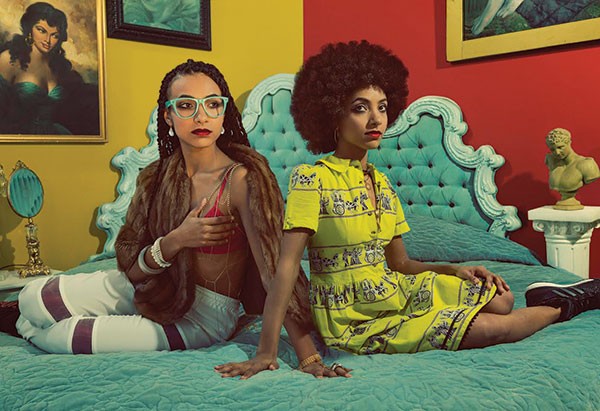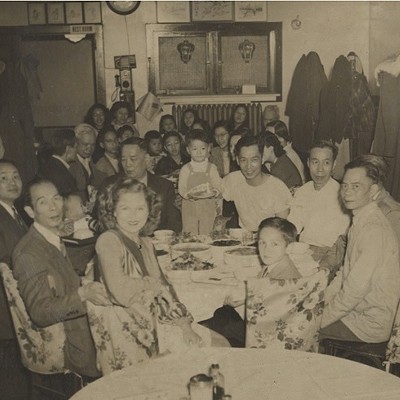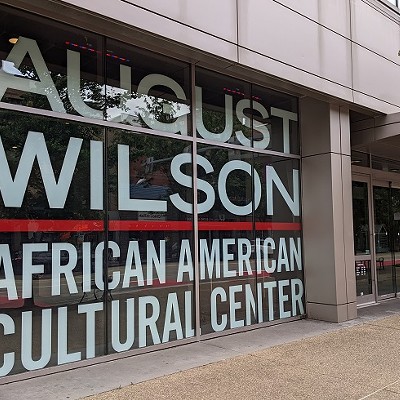Esperanza Spalding and the evolution of pop music
“My overarching sentiment about making music is: Do whatever you want.”

Esperanza Spalding, at left
ESPERANZA SPALDING
8 p.m. Fri., Oct. 7. August Wilson Center, 980 Liberty Ave., Downtown. $55-65. 412-471-6070 or trustarts.org
Cross-genre sensation Esperanza Spalding is something of an anomaly — albeit a welcome one — on today’s pop-music landscape. A fine singer with an impressive range, she’s also a supremely accomplished composer and musician, one with a thundering command of her primary instruments: upright bass and electric bass guitar. Spalding and her band will appear at Pittsburgh’s August Wilson Center on Oct. 7.
Emily’s D+Evolution is Spalding’s fifth album, and songs like “Earth to Heaven” showcase a dizzying yet highly appealing synthesis of rock, funk, soul and jazz. As the youngest person ever to join the faculty of the prestigious Berklee College of Music upon her 2005 graduation, she went on to become the first jazz artist to win the Grammy Award for Best New Artist in 2011, famously besting pop idol Justin Bieber.
In a phone interview, Spalding takes issue with the suggestion that the music on Emily’s D+Evolution could serve as a kind of “gateway drug,” drawing listeners into a new appreciation for jazz. For example, “If somebody heard [1970s jazz-fusion group] Weather Report and didn’t like it, that’s fine,” she says. “That’s where they’re at, and I don’t think that my record is somehow going to open up their faculties.” She laughs and adds, “When I first heard Weather Report, I didn’t like it!” But once she began to appreciate that group’s music — a combination of pop-friendly melodies and intense, high-level instrumental interplay — she was hooked. “When I came to it, it was like nothing else in the world.”
In retrospect, Spalding’s childhood in Portland, Ore., provided some clues to the path she would eventually pursue. She was a prodigy, a self-taught violinist by age 5. By 15, she was concertmaster with the Chamber Music Society of Oregon. A musical omnivore, she was influenced early by artists as varied as Felix Mendelssohn, LL Cool J and Stone Temple Pilots. Describing her own music, she admits that some of it “would raise the eyebrows of a pop listener, but my overarching sentiment about making music is: Do whatever you want. It’s a common language.”
Spalding continues on this theme: “When I am making music with other people, and I lay out a language or structure for a project, then I like to explore and find what the music can do.” The way to do that, she believes, is “via trial and error and experimentation with my fellow musicians. And if nothing else, that spirit — that playful, exploratory spirit — makes its way into the music.”
But Esperanza Spalding’s music has it both ways: it’s ambitious and accessible. Listeners who want challenging arrangements, knotty vocal harmonies and intelligent lyrics will find plenty to enjoy on Emily’s D+Evolution, but those who ask for nothing more than catchy tunes with indelible hooks will be equally impressed. She notes that some engineers or “sound designers” might have tried to make her music sound like a jazz record, “but I knew that couldn’t happen,” she says. “Because the music is bigger, it’s fatter and it’s livelier. It’s a lot of things.”
Emily’s D+Evolution is Spalding’s fifth album, and songs like “Earth to Heaven” showcase a dizzying yet highly appealing synthesis of rock, funk, soul and jazz. As the youngest person ever to join the faculty of the prestigious Berklee College of Music upon her 2005 graduation, she went on to become the first jazz artist to win the Grammy Award for Best New Artist in 2011, famously besting pop idol Justin Bieber.
In a phone interview, Spalding takes issue with the suggestion that the music on Emily’s D+Evolution could serve as a kind of “gateway drug,” drawing listeners into a new appreciation for jazz. For example, “If somebody heard [1970s jazz-fusion group] Weather Report and didn’t like it, that’s fine,” she says. “That’s where they’re at, and I don’t think that my record is somehow going to open up their faculties.” She laughs and adds, “When I first heard Weather Report, I didn’t like it!” But once she began to appreciate that group’s music — a combination of pop-friendly melodies and intense, high-level instrumental interplay — she was hooked. “When I came to it, it was like nothing else in the world.”
In retrospect, Spalding’s childhood in Portland, Ore., provided some clues to the path she would eventually pursue. She was a prodigy, a self-taught violinist by age 5. By 15, she was concertmaster with the Chamber Music Society of Oregon. A musical omnivore, she was influenced early by artists as varied as Felix Mendelssohn, LL Cool J and Stone Temple Pilots. Describing her own music, she admits that some of it “would raise the eyebrows of a pop listener, but my overarching sentiment about making music is: Do whatever you want. It’s a common language.”
Spalding continues on this theme: “When I am making music with other people, and I lay out a language or structure for a project, then I like to explore and find what the music can do.” The way to do that, she believes, is “via trial and error and experimentation with my fellow musicians. And if nothing else, that spirit — that playful, exploratory spirit — makes its way into the music.”
But Esperanza Spalding’s music has it both ways: it’s ambitious and accessible. Listeners who want challenging arrangements, knotty vocal harmonies and intelligent lyrics will find plenty to enjoy on Emily’s D+Evolution, but those who ask for nothing more than catchy tunes with indelible hooks will be equally impressed. She notes that some engineers or “sound designers” might have tried to make her music sound like a jazz record, “but I knew that couldn’t happen,” she says. “Because the music is bigger, it’s fatter and it’s livelier. It’s a lot of things.”

















